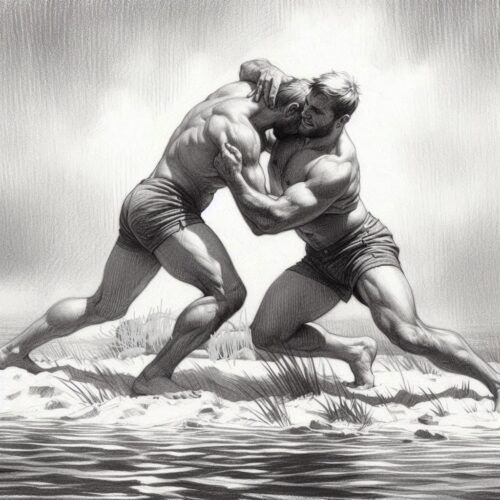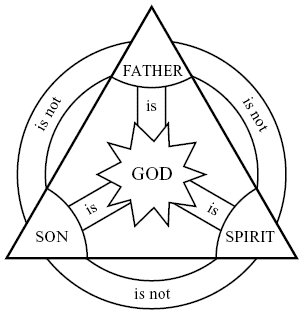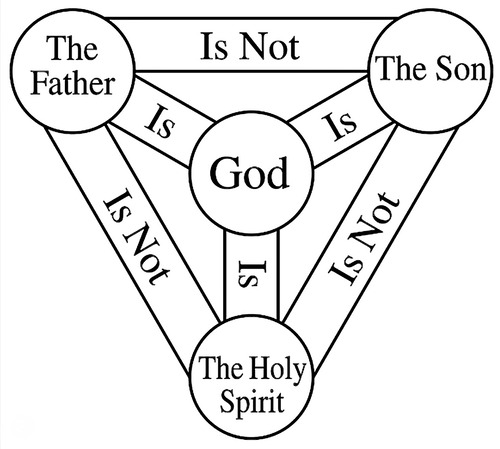The Mystery Duel at Peniel: Why Would God Wrestle with Jacob?
Jacob was no stranger to struggles. Even in the womb, he’d grapple with his twin, Esau—grasping at his heel at birth—an act that would earn him the name of “deceiver.” Jacob’s life was defined by contests. He competed against Esau’s natural charm for his father Isaac’s affection. He cunningly wrestled away his brother’s birthright for a bowl of stew, before also deceiving their father to steal Esau’s blessing. Later, he’d engage in a battle of wits with his uncle Laban over wives, wages, and wealth. So Jacob knew what it meant to fight for what he wanted, whether through cunning, determination, or sheer force of will.
Now, on the eve of his most dreaded reunion—with the brother he’d wronged decades ago—Jacob would encounter a struggle unlike any other. By the Jabbok River, in the darkness of night, he’d find himself locked in physical combat with an opponent who was no mere mortal. The mysterious wrestler would prove to be God Himself. The divine encounter would transform not only Jacob’s name and body but the very essence of his character. It is one of Scripture’s most enigmatic and profound passages: why would the Almighty choose to meet His servant in hand-to-hand combat?
The Historical Setting
To understand the significance of this divine duel, we must first grasp the context. Jacob is returning to his homeland after a 20-year exile, having fled Esau’s murderous rage. He’d prospered in Paddan-aram, acquiring wives, children, and considerable wealth. Yet news of Esau approaching with four hundred men throws him into deep distress. Having sent his family and possessions across the Jabbok, Jacob remains alone on the northern bank—caught between his past sins and an uncertain future.
The Wrestling Match
In this moment of solitude, the mysterious encounter begins. Scripture tells us “a man” wrestled with Jacob until daybreak. The identity of the opponent is initially unclear, but as the narrative unfolds, it becomes evident this is no ordinary adversary. The wrestling match is intensely physical—so much so it would leave Jacob with a permanent limp. It also carries profound spiritual significance.
The duration of the struggle is telling: it lasts until dawn. Jacob’s persistence demonstrates a remarkable determination that would ultimately be commended rather than condemned. When his opponent seeks to end the match at daybreak, Jacob utters words that reveal the spiritual nature of this encounter: “I will not let you go unless you bless me.” He’d recognised this is no ordinary wrestling match but a divine appointment that would determine his destiny.
The Transformation
It’s at this pivotal moment God transforms both Jacob’s identity and character. His name is changed from Jacob (“deceiver”) to Israel (“he struggles with God” or “God strives”). The renaming is far more than a mere change of title—it represents a fundamental transformation of character. The man who’d spent his life wrestling through deception and cunning is now given a name that honours his direct struggle with God.
The physical mark of this encounter—a dislocated hip—would serve as a permanent reminder of this night. Jacob’s limp would be a visible testament to the truth that encounters with God leave us forever changed. His natural strength was diminished so that he might learn to rely on God’s enabling. The sun rises on a new day, and Jacob—now Israel—emerges a different man: blessed, humbled, and marked for life by his encounter with God.
Why Would God Wrestle With Jacob?—The Theological Significance
The wrestling match at Peniel reveals several profound theological truths that shape our understanding of God’s interaction with humanity:
- Divine Condescension: God’s willingness to appear in human form and engage in physical combat demonstrates His remarkable humility in relating to us. This foreshadows the ultimate divine condescension in the incarnation of Christ, where God would again take human form to meet us where we are. The fact that the Almighty would limit Himself to wrestle with Jacob reveals a God who’s both transcendent, yet intimately accessible.
- Persistent Faith: Jacob’s determination to hold on until he receives a blessing illustrates the power of persistent faith. His wrestling isn’t seen as rebellion, but rather as commendable tenacity, showing us God honours those who earnestly seek Him even through struggle. The persistence is rewarded not with punishment but with blessing: this shows us God welcomes honest, determined engagement from His people.
- Divine Sovereignty: Despite Jacob’s physical effort, the blessing he receives is entirely God’s to give. The encounter shows us while our striving has its place, transformation and blessing ultimately come from God’s sovereign choice. The mysterious wrestler could have ended the match at any moment but chooses to let it continue until His purposes are fulfilled.
- Wounding and Blessing: The paradoxical connection between Jacob’s injury and his blessing reveals a paradoxical spiritual principle. His wounded hip and subsequent blessing aren’t separate events but intertwined aspects of transformation. The pattern suggests God’s blessings often come through experiences that humble and change us.
Covenant Implications
The encounter isn’t just a personal experience for Jacob: it has far-reaching implications for God’s covenant purposes:
- Abrahamic Connection: The wrestling match and subsequent blessing are directly connected to God’s promises to Abraham. Jacob’s new name, Israel, marks him as the covenant bearer through whom God’s promises to Abraham would continue. The transformation comes at the crucial moment he is returning to the promised land, linking personal transformation with covenant fulfillment.
- Prophetic Fulfillment: The encounter fulfils God’s earlier promises about Jacob’s role and destiny. When Rebecca receives the prophecy about her twins before their birth, God tells her the older would serve the younger. Now, through this wrestling match, Jacob is finally prepared to fully step into the prophesied role as a patriarch of God’s people.
- National Identity Formation: The name Israel would become the identity of an entire nation. This wrestling match is therefore a foundational moment in Israel’s national consciousness, explaining both their name and their characteristic of struggling with God. The people of Israel would continue to identify with their forefather’s experience of both struggling with God and being blessed by Him.
- Covenant Commitment: The physical struggle serves as a kind of covenant renewal ceremony, though unique in its form. Through this encounter, God reaffirms His commitment to Jacob while simultaneously transforming him into the person he needs to be for covenant purposes. This shows how God’s covenant faithfulness often works through personal transformation.
Practical Applications
This ancient narrative speaks to modern believers as well. Like Jacob, we often find ourselves wrestling with God—in prayer, in our circumstances, in our understanding of His will. The story teaches us such struggles, while difficult, can be holy ground where inner transformation occurs. It encourages us to persist in seeking God’s blessing, even when the encounter is painful or costly.
Moreover, Jacob’s experience reminds us God often works through our weaknesses rather than our strengths. The limp that marked Jacob’s encounter with God is a testament to divine grace rather than human ability. In our own struggles with God, we keep noting our points of weakness are the very places where God’s strength is most clearly displayed.
Conclusion: Why Would God Wrestle With Jacob?
The mystery of God wrestling with Jacob reveals a profound truth about our relationship with God. He meets us in our struggles, engages with us in our conflicts, and transforms us through our encounters with Him. Jacob’s wrestling match at Peniel is an enduring testament to the truth that God’s blessings often come through struggle. That transformation frequently requires a willingness to engage with God, in the darkest nights of our souls.
As the sun rises on Jacob that morning, he walks away with a new name, a new nature, and a new understanding of both God and himself. His limp isn’t a mark of defeat but a badge of honour—evidence he’d wrestled with God and prevailed. For all who find themselves in similar struggles with God, Jacob’s story offers hope. Our encounters with God, even when they wound us, ultimately serve to bless us.
Why Would God Wrestle With Jacob?—Related FAQs
Why does God sometimes make us struggle instead of just blessing us directly? Our struggles serve as instruments of transformation, breaking our self-reliance, bringing us to the end of ourselves, and teaching us to depend wholly on God. Just as Jacob’s wrestling left him with both a limp and a blessing, our struggles often become the very means through which God’s grace is manifested in our lives. Our wrestling matches with God are not punishments, but rather divine appointments for deeper fellowship and transformation.
- How can we tell if we’re wrestling with God or just facing normal difficulties? Wrestling with God typically involves deep spiritual questioning, persistent prayer, and a sense of direct engagement with matters of faith and obedience. Like Jacob, we often find ourselves in these struggles at pivotal moments of our spiritual journey, especially when God is working to transform our character. The key distinction is: wrestling with God always has spiritual growth as its ultimate purpose.
- What does it mean that God blessed Jacob through injury? The injury to Jacob’s hip represented the breaking of his self-sufficiency and natural strength, making way for true spiritual power. This paradox – that weakness becomes the channel for God’s strength – is a central theme in God’s dealings with His people. The permanent limp served as a constant reminder that God’s blessings often come through humbling experiences.
How should we respond when God seems to be wrestling with us? We should follow Jacob’s example of persistent engagement, refusing to let go until we receive God’s blessing. This doesn’t mean being rebellious, but rather maintaining faithful engagement with God even when it’s difficult. Our response should combine Jacob’s determination with humble recognition that any blessing comes from God’s grace alone.
- Does wrestling with God mean we lack faith? On the contrary, wrestling with God can be one of the highest expressions of faith, as it demonstrates both earnest engagement with God and unwillingness to leave without His blessing. Jacob’s wrestling showed tremendous faith in believing God could and would bless him. Such wrestling often reflects deep faith that persists even in confusion or pain.
- What is the relationship between personal transformation and divine blessing? Divine blessing often requires personal transformation, as seen in God changing Jacob’s name to Israel. God’s blessings aren’t just external gifts but often involve internal transformation of our character and nature. The struggle itself becomes part of the blessing as it shapes us into people capable of carrying God’s purposes.
How do our personal struggles relate to God’s larger covenant purposes? Our individual wrestling matches with God, like Jacob’s, often connect to larger purposes in God’s kingdom work. Personal transformation through struggle prepares us to be more effective instruments in God’s covenant purposes. Just as Jacob’s wrestling impacted the entire nation of Israel, our faithful endurance through struggles can have far-reaching effects in God’s plan.
Why Would God Wrestle With Jacob? Our Related Posts
Editor's Pick

Paul’s Mandate for Men: Headship Or Servant Leadership? Or Both?
Modern Christianity has fallen into a trap. We've created an either/or battle between "headship" and "servant leadership," as if these [...]

Should We Stop Using Male Pronouns for God? Why Do We Say No?
A friend of ours arrived eagerly at his first theology class in seminary. But he quickly discovered something troubling: the [...]

Did Old Testament Law Force Women to Marry their Rapists?
**Editor’s Note: This post is part of our series, ‘Satan’s Lies: Common Deceptions in the Church Today’… Viral misinformation abounds [...]

From Danvers To Nashville: Two Statements, One Biblical Vision
30 years separate the Danvers Statement on Biblical Manhood and Womanhood (1987) and the Nashville Statement on Human Sexuality (2017). [...]

The Nashville Statement: Why Affirm It Despite Media Backlash?
WHY DO REFORMED CHRISTIANS STAND BY THIS STATEMENT ON MARRIAGE AND GENDER? When the Nashville Statement was released in 2017, [...]

Who Is Belial? Solving The 2 Corinthians 6:15 Mystery
Belial: This name from the pages of Scripture chills the soul. Who is this mysterious figure Paul invokes in 2 [...]

Celibacy Or Castration: What Jesus Really Means in Matthew 19:12
One of Scripture's most shocking misinterpretations led theologian Origen to castrate himself in the third century. His tragic mistake? Taking [...]

Philippians 4:13: Did Paul Really Mean We Can Do ALL Things?
"I can do all things through Christ who strengthens me." It's on gym walls, graduation cards, and motivational posters everywhere. [...]

The Ordinary Means of Grace: Why Are They Indispensable?
ORDINARY MEANS FOR EXTRAORDINARY TRANSFORMATION What if God's most powerful work in believers' lives happens through the most ordinary activities? [...]

Is the Bible God’s Word? Or Does It Only Contain God’s Word?
The authority of Scripture stands at the crossroads of modern Christianity. While some argue the Bible merely contains God’s Word [...]
SUPPORT US:
Feel the Holy Spirit's gentle nudge to partner with us?
Donate Online:
Account Name: TRUTHS TO DIE FOR FOUNDATION
Account Number: 10243565459
Bank IFSC: IDFB0043391
Bank Name: IDFC FIRST BANK






